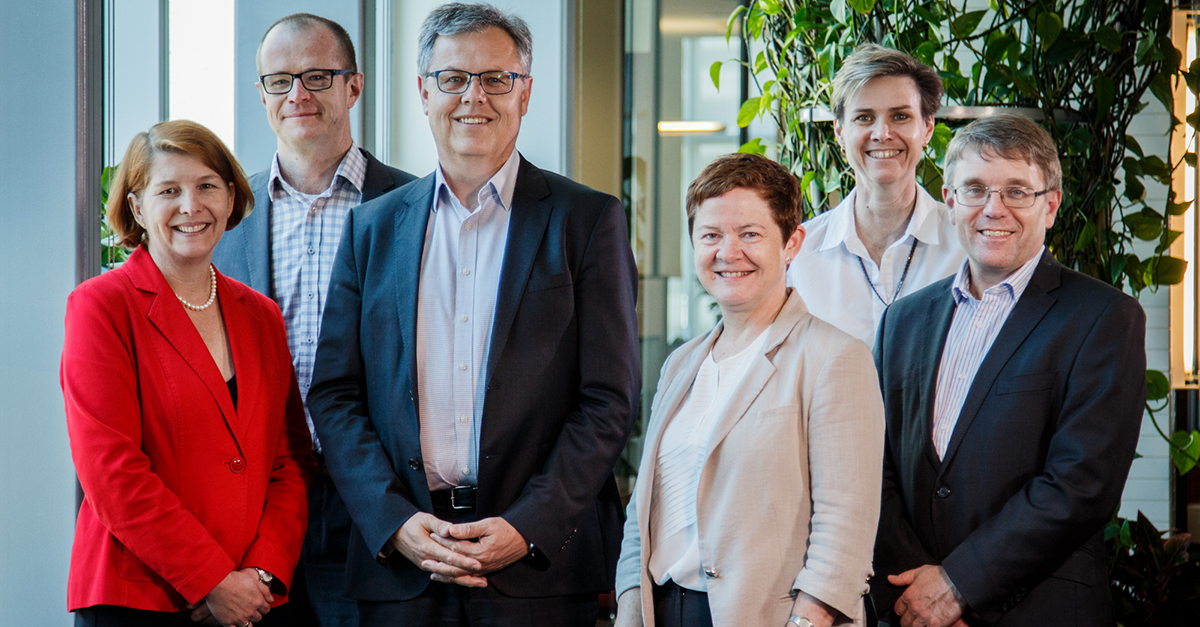Leading the way towards gender parity
07 March 2016
Ahead of International Women’s Day, we spoke to the Bureau’s five Deputy Directors (division heads) about challenges and pathways to gender parity.
International Women’s Day celebrates the social, economic, cultural and political achievement of women, but highlights the continuing need for progress towards gender parity. 'It's a celebration of the achievements of women,' says Rob Webb (Deputy Director Hazards Warnings and Forecasts), but is also 'a reminder that we don’t have equality in the workplace, and compels us to ask the question "why?".'
The Bureau of Meteorology is unusual among government agencies and technical organisations in having an executive with a 50:50 balance of women and men—a male Director (Chief Executive Officer), two male Deputy Directors (division heads) and three female Deputy Directors (division heads). We spoke to all five Deputy Directors about International Women’s Day and their experiences of diversity in the workplace.

The Bureau of Meteorology Executive in February 2016.
From left to right: Vicki Middleton (Deputy Director, Corporate and Chief Operating Officer); Rob Webb (Deputy Director Hazards Warnings and Forecasts); Dr Rob Vertessy (Director and Chief Executive Officer); Dr Sue Barrell (Deputy Director, Observations and Infrastructure); Dr Lesley Seebeck (Chief Information Officer and Deputy Director Information Systems and Services); and Graham Hawke (Deputy Director Environment and Research).
Why diversity?
Dr Lesley Seebeck (Chief Information Officer and Deputy Director Information Systems and Services) and Graham Hawke (Deputy Director Environment and Research) both stressed the value of diversity to teams and organisations: To build a strong team, Lesley recommends seeking out complementary skill sets and 'people who can and will tell you when you’re wrong'; or as Graham puts it, 'Why wouldn't you fish from the whole ocean, rather than just part of it? Diversity, across all spectrums, is critical for better decision-making.'
Rob Webb is pleased to see boardrooms starting to reflect the diversity of society, and points out that so-called stereotypically 'male' approaches to leadership such as being assertive and 'leading from the front' are not the only ways to do things. 'Listening and allowing solutions to grow can produce amazing outcomes,' says Rob. 'The fact is that the right talent can come from anywhere, so the key is getting the skills right. This might mean challenging our thinking and redefining what we chase in our leaders—only then will we promote true diversity.’
Unconscious bias
There is a tendency for managers to recruit and promote people like themselves, notes Graham, and to value the same kind of experiences that they have benefited from. Men and women also make assumptions about people in certain roles and fields. Dr Sue Barrell (Deputy Director, Observations and Infrastructure) recalls a phone interview with a radio station, which began with the presenter introducing 'Dr S. Barrell' and how 'he' would be talking about computer graphics. Another time, government representatives greeted Sue’s tall, male research colleague while ignoring Sue, unaware that she was leading the research project.
These assumptions can be challenged at any stage of life. Too often, says Sue, science is 'invisible' to girls at school. When she was in year 9, in an all-girls school, her maths teacher introduced an advanced maths course so that girls interested in physics and engineering didn’t have to take classes at the nearby boys' school. The message to Sue was that she could control her own destiny.
Graham Hawke insists on diversity (including gender balance) in all selection panels, to guard against bias and 'group-think', while Lesley Seebeck recommends regularly examining your own assumptions and 'mental shortcuts' to check that they’re still valid.
Vicki Middleton (Deputy Director, Corporate and Chief Operating Officer) has received invitations to join boards in order to meet gender quotas, and responds by saying 'I'll send you my CV and if you think I can contribute apart from my gender, I will.' Her approach is to be herself, and use such opportunities to diversify people's preconceptions of gender.
It’s the people who make the difference
Rob Webb gives credit to people who have helped him to 'unpick' his thinking, or challenged him to think from a different perspective, for helping to develop his career. In particular, he cites his predecessor Dr Ray Canterford as an 'Inspirational person in terms of his ability to reflect and absorb what others are saying before responding.'
As well as her year 9 maths teacher, Sue Barrell is also thankful to Elena Manaenkova (Assistant Secretary-General of the World Meteorological Organization), who helped Sue to recognise and have confidence in her unique strengths. A lot of women don't see themselves as special, says Sue, and can 'perpetuate their own diminished visibility'.
Career choices should not just be about the next promotion, says Lesley Seebeck, but opportunities to work with people who challenge and support you. Likewise, Vicki Middleton feels that the people who encouraged her to expand her horizons beyond her science background 'have been catalytic in broadening [her] understanding of other people's perspectives and becoming immersed in the political sphere.'


Comment. Tell us what you think of this article.
Share. Tell others.